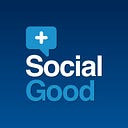Providing Girls and Women Everywhere With a Support System
Priyanka Jaisinghani is a +SocialGood Connector and co-founder of Girlz,FTW, an international organization that provides mentorship and a support system to girls and women around the world. In our SDGs on the Ground series, Priyanka describes her initiative, and how her work has been shaped by the COVID-19 pandemic.
Tell us about your current work driving momentum on the SDGs in your community. From an SDG perspective, what are the most immediate needs specific to your community?
This past year, the world as we knew it shifted beneath our feet at a speed that felt almost impossible to keep pace with on a global scale. At Girlz,FTW, our community of women and girls, who represent over 73 countries, tackled the effects of the pandemic in a multitude of ways. From both a global and local perspective, our members faced the direct effects of the pandemic, fractured healthcare systems, political instability, ideological division, food scarcity, violence, and financial insecurity. On a more local level, the girls in our program continue to face uphill battles — whether it’s dealing with complex family issues, violence in their communities, attempting to virtually attend school and/or work — all while working and caring for their families.
Despite all of this, we are continuously in awe of the resilience and strength in our community. While the world has altered in unimaginable ways, this has only strengthened our resolve, both individually and collectively to provide a safe space for our community to connect, engage and elevate each other in addition to finding meaningful support systems.
Translating these lived experiences on an SDG level, the most immediate needs of our community will intertwine with COVID-19 recovery efforts, but most importantly connect to SDG 8 (decent work and economic growth) and SDG 17 (partnerships for the goals). This moment is an opportunity to reimagine sectors, form new partnerships, and create new opportunities to flourish. Across all sectors, women have been impacted the hardest, and we strive to provide the tools and resources to get them back on their feet — through continued mentorship, dialogues, offering digital resources, and continuing to create safe spaces for them to gather.
How has COVID-19 impacted SDG implementation in your community/ region/ nation? As some countries begin to focus on recovery from the pandemic, do you notice a greater emphasis on the SDGs or using the SDGs as a roadmap for recovery in your community, and if so, how?
Due to the nature of our global program, we’re witnessing the gaping divide in recovery efforts, and at this moment, the lack of equity in vaccine distribution efforts. As I write this from North America, we continue to increase our vaccination rates. On the other side of the world, where many of our community and team members reside, India is grappling with their fractured healthcare systems, and Nigeria only started vaccination efforts in late spring, with the hope to have 70% of its population vaccinated by 2022. It’s a tale of two cities (or in this case, recovery efforts).
On a more direct level, whether through WhatsApp messages, Zoom workshops or other virtual spaces, our community gathered around tough conversations, formed beautiful friendships, and cultivated meaningful contributions. More specifically, we’ve seen our members connect and reflect on the similarities in our challenges, and replicate solutions from one country to the next. We’re seeing younger generations transcend from awareness of the SDGs to leveraging them as a roadmap in how they can build a better world. They’re reimagining a new world and new systematic structures that will enable them to create new livelihoods , and prioritize their physical, mental, and spiritual wellbeing.
Beyond COVID-19, what are the main challenges you’ve experienced in your work to advance the SDGs in your community/region/nation?
We’ve witnessed two main challenges within our community: mental health and burnout, and the digital divide. The ongoing trauma of this pandemic has taken a heavy emotional toll on everyone, and mental health and wellbeing have become a top priority for our community. As a community, we came together to discuss the effects of mental health in our daily lives, which in many cultures was still taboo. We organized community dialogues around learning how to prioritize ourselves and unlearning harmful career norms that prohibited many of us from seeking the resources we needed during this time. For many of our girls, this moment also led to burnout and a dropoff in engagement.
In addition, over the past year, we’ve transformed all available corners of our homes into new remote workplaces, classrooms for students, and social gathering spaces for all. As much of the world gathers online, however, in many of the countries that our girls live in, the infrastructure is unable to support bandwidth and capacity for them to actively participate online, exacerbating existing inequalities. Meetings often involve technical glitches, and lagged, sporadic connection. For many of our girls, their cell phones are their main method to connect as laptops and devices are not only theirs, but shared among their family members. We’re moving away from the thought of having a reliable internet connection as a nice-to-have, and starting to see digital access as a fundamental right.
Can you point out some successes you’ve had in your work to advance the SDGs in your community/region/nation ?
After understanding the challenges of our community and the resources they crave, in December 2020, GirlzFTW hosted the Girlz,RTW Summit (10 virtual workshops).
The summit aimed to provide girls around the globe with access to training, empowerment, and mentorship to pursue their dreams and reimagine the possibilities available to them. This year’s conference focused on helping girls build resilience during tough times, create supportive communities, and gain a better understanding of themselves so they can unlock their own potential. Sessions included: unlearning harmful career norms, building resilience, and communication skills for a virtual world.
